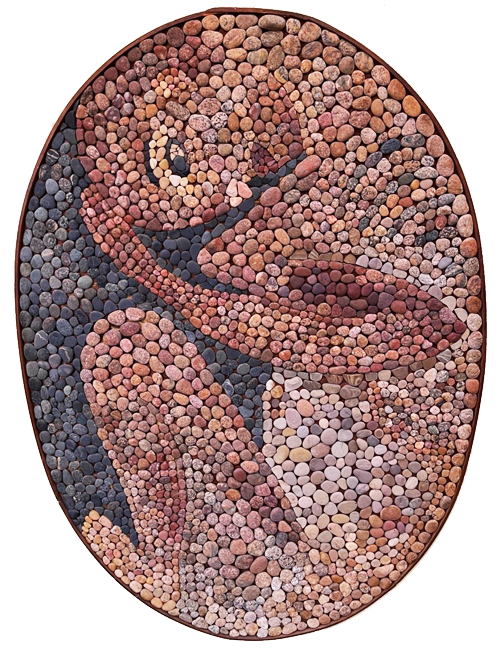What is mental fitness?
Mental fitness is indeed “that six-pack of mental abs that keeps you on top of your game through thick and thin. It’s the belief you can climb any emotional mountain that looms in your way. It’s the savvy that propels you through the rockiest social hurdles with confidence. It’s an inner deep self-trust.” That’s how I described it on the back of the book. However, there’s more that could be said to define just what it is.
Let’s clarify one source of confusion, the difference between brain care and mind building. Numerous brain-stimulating exercises have been found to fend off the effects of aging and to make your brain operate better. This kind of exercise is like weight-lifting or jogging to get your body fit but it won’t guarantee that you’ll win a marathon or a tennis match. Countless diet programs promise to rejuvenate your brain, but healthy, quick-functioning neurons won’t deliver you mental fitness. These do provide a good foundation.

What is mental fitness?
Mental fitness is indeed “that six-pack of mental abs that keeps you on top of your game through thick and thin. It’s the belief you can climb any emotional mountain that looms in your way. It’s the savvy that propels you through the rockiest social hurdles with confidence. It’s an inner deep self-trust.” That’s how I described it on the back of the book. However, there’s more that could be said to define just what it is.
Let’s clarify one source of confusion, the difference between brain care and mind building. Numerous brain-stimulating exercises have been found to fend off the effects of aging and to make your brain operate better. This kind of exercise is like weight-lifting or jogging to get your body fit but it won’t guarantee that you’ll win a marathon or a tennis match. Countless diet programs promise to rejuvenate your brain, but healthy, quick-functioning neurons won’t deliver you mental fitness. These do provide a good foundation.


What is mental fitness?
Mental fitness is indeed “that six-pack of mental abs that keeps you on top of your game through thick and thin. It’s the belief you can climb any emotional mountain that looms in your way. It’s the savvy that propels you through the rockiest social hurdles with confidence. It’s an inner deep self-trust.” That’s how I described it on the back of the book. However, there’s more that could be said to define just what it is.
Let’s clarify one source of confusion, the difference between brain care and mind building. Numerous brain-stimulating exercises have been found to fend off the effects of aging and to make your brain operate better. This kind of exercise is like weight-lifting or jogging to get your body fit but it won’t guarantee that you’ll win a marathon or a tennis match. Countless diet programs promise to rejuvenate your brain, but healthy, quick-functioning neurons won’t deliver you mental fitness. These do provide a good foundation.
Mental fitness is the art of keeping your Executive Brain in charge to reduce fight-or-flight reactivity. Most of us feel our bodies engage numerous times each day to protect us from threats that our bodies can’t help solve. With mental fitness your most-evolved brain part can limit your less-evolved brain parts’ tendencies to signal your body into fight-or-flight (see video).
Consider what options your body has: it can punch somebody out or yell or run away. How does this help when you’re caught in traffic, you can’t find your keys or you’ve lost your purse? Athletes have benefitted from recent discoveries about how our bodies can be strengthened and healed. Functional MRIs and other brain studies have made it possible for more people to achieve mental fitness. Fortunately, most of us don’t need these to engage in claiming ours.
Remember that mental fitness can also bring you joy! It’s good to have a body that isn’t in pain, but it’s wonderful to pursue all the activities you love. The same goes for your mind; relationships and individual pursuits are more fun and satisfying when you have the confidence and skills to embrace them.
Why must you claim your mental fitness?
Mental fitness is something you must claim throughout your life. If you have a fully functioning brain and had mentally healthy parents, you had a head start. But your brain doesn’t naturally allow you to know everything that makes you tick. When you keep your mental fitness sharp, you’ll avoid reacting to stress with mental symptoms, just as the physically fit person fights off cold and disease better than one who’s just getting by. Faced with tough situations you’ll have the skills to challenge yourself to become mentally stronger, just like the athlete jumping a higher hurdle.
Prepare to engage life like a mental marathon. You can feel high when you cope better with that horrid co-worker or toxic sister or frustrating computer problem. You’ll feel excited that you didn’t get panicky, confused or depressed during a stressful time and you’ll know just how you got there. You’ll be proud of what you’ve overcome and confident to tackle new challenges.
Why don’t more people seek mental fitness?
- Our sense of ourselves comes mostly from how we experience our minds.
Around the world people avoid seeking help for mental health issues until their problems interfere significantly with their lives. Any type of mental “weakness” is still considered personally and socially threatening. Fight-or-flight responses dominate in the person with mental dysfunction. Society responds with denial, avoidance, punishment, anger and rejection, all examples of fight-or-flight reactions. A broken leg or stomach pain doesn’t affect how we or others see us as people.You may notice that we accept times of physical illness as an ordinary part of life occurring in multiple ways and varying degrees. We ignore our mental health until we have serious problems with coping. We’ll see a doctor if we have a sprained finger and not wait until we have a broken wrist. How long are people anxious, depressed or struggling with a relationship before they’ll seek any kind of help? This makes it more likely they’ll develop the disturbing symptoms they and those who know them fear. - Mental health professionals have created a huge messaging problem in Western society.
During the first half of the twentieth century people who sought help were diagnosed with problems based on theories and guesswork. There were almost no scientific studies to understand how our brains work or what treatments would be best for each kind of mental problem. If you sought help, you’d be considered neurotic (pathologically anxious), psychotic (deranged and possibly dangerous) or character disordered (genetically deficient in empathy). Diagnostic test focused on identifying which of these a person had. Clients would be solemnly advised of these insights, prescribed mostly sedating medication and offered expensive, lengthy treatment not proven to be effective for their problem.

- Our sense of ourselves comes mostly from how we experience our minds.
Around the world people avoid seeking help for mental health issues until their problems interfere significantly with their lives. Any type of mental “weakness” is still considered personally and socially threatening. Fight-or-flight responses dominate in the person with mental dysfunction. Society responds with denial, avoidance, punishment, anger and rejection, all examples of fight-or-flight reactions. A broken leg or stomach pain doesn’t affect how we or others see us as people.You may notice that we accept times of physical illness as an ordinary part of life occurring in multiple ways and varying degrees. We ignore our mental health until we have serious problems with coping. We’ll see a doctor if we have a sprained finger and not wait until we have a broken wrist. How long are people anxious, depressed or struggling with a relationship before they’ll seek any kind of help? This makes it more likely they’ll develop the disturbing symptoms they and those who know them fear. - Mental health professionals have created a huge messaging problem in Western society.
During the first half of the twentieth century people who sought help were diagnosed with problems based on theories and guesswork. There were almost no scientific studies to understand how our brains work or what treatments would be best for each kind of mental problem. If you sought help, you’d be considered neurotic (pathologically anxious), psychotic (deranged and possibly dangerous) or character disordered (genetically deficient in empathy). Diagnostic test focused on identifying which of these a person had. Clients would be solemnly advised of these insights, prescribed mostly sedating medication and offered expensive, lengthy treatment not proven to be effective for their problem.

New ideas to transform mental health into something cool and exciting

In the second half of the twentieth century scientific studies of how to help people with various mental problems, along with studies of the brain itself, transformed the practice of most mental health professionals. Gradually our society is becoming less fearful about what mental health problems mean about a person. Growing numbers of services designed to build on people’s strengths appear daily to make it easier for people to seek help before they and those around them suffer too much.
For example, most people with social anxiety can learn strategies to navigate now. They don’t have to endure life-long medication and heavy-handed speculation about childhood trauma, deep insecurity or suppressed rage. If they have any of these issues, they can be served with proven techniques that leave their dignity intact and build their confidence from day one. Some “professionals” still cling to unproven theories and haven’t studied the widely validated cognitive therapy and brain research now available. Mental health associations and victims must step up to sideline these ineffective and often harmful practitioners.
Mental health is the state people automatically claim. Generally we still don’t welcome suggestions that counseling might help us cope, because that places us in the dread mental-illness category. We need to define a middle ground where we can talk about mental health like we talk about physical health. ‘Personal growth’ is widely embraced by many in our society today. Mental fitness training offers proven strategies for personal growth and its rewards of reduced stress, self-confidence and authentic relationships.
What could a mental fitness center look like? There would have to be different rooms for various levels of concentration. Some would be quiet and painted in calming shades of green or blue with soft lights and individual study centers. Others would offer music for those wanting to have their favorite sounds to soothe and inspire them. Others would open out to a forest or a garden where people could wander or sit outdoors. All would provide comfortable and flexible seating with computer access. With these members could explore new ways to manage their fight-or-flight tendencies and concepts that help with specific relationship or self-management problems.
Beyond the physical setting, professional guides would be available to answer questions or offer counsel. They would lead groups to focus on a particular challenge or to help members practice new relationship skills. There would be medical specialists trained to provide ongoing access to the least medication needed for those whose brains weren’t supporting their work. Functional-medicine-trained practitioners could advise people on how to maintain the healthy guts a capable brain requires. Nearby workout rooms and trainers would encourage refreshing and healing exercise. Shame wouldn’t be on the program.
New ideas to transform mental health into something cool and exciting
In the second half of the twentieth century scientific studies of how to help people with various mental problems, along with studies of the brain itself, transformed the practice of most mental health professionals. Gradually our society is becoming less fearful about what mental health problems mean about a person. Growing numbers of services designed to build on people’s strengths appear daily to make it easier for people to seek help before they and those around them suffer too much.

For example, most people with social anxiety can learn strategies to navigate now. They don’t have to endure life-long medication and heavy-handed speculation about childhood trauma, deep insecurity or suppressed rage. If they have any of these issues, they can be served with proven techniques that leave their dignity intact and build their confidence from day one. Some “professionals” still cling to unproven theories and haven’t studied the widely validated cognitive therapy and brain research now available. Mental health associations and victims must step up to sideline these ineffective and often harmful practitioners.
Mental health is the state people automatically claim. Generally we still don’t welcome suggestions that counseling might help us cope, because that places us in the dread mental-illness category. We need to define a middle ground where we can talk about mental health like we talk about physical health. ‘Personal growth’ is widely embraced by many in our society today. Mental fitness training offers proven strategies for personal growth and its rewards of reduced stress, self-confidence and authentic relationships.
What could a mental fitness center look like? There would have to be different rooms for various levels of concentration. Some would be quiet and painted in calming shades of green or blue with soft lights and individual study centers. Others would offer music for those wanting to have their favorite sounds to soothe and inspire them. Others would open out to a forest or a garden where people could wander or sit outdoors. All would provide comfortable and flexible seating with computer access. With these members could explore new ways to manage their fight-or-flight tendencies and concepts that help with specific relationship or self-management problems.
Beyond the physical setting, professional guides would be available to answer questions or offer counsel. They would lead groups to focus on a particular challenge or to help members practice new relationship skills. There would be medical specialists trained to provide ongoing access to the least medication needed for those whose brains weren’t supporting their work. Functional-medicine-trained practitioners could advise people on how to maintain the healthy guts a capable brain requires. Nearby workout rooms and trainers would encourage refreshing and healing exercise. Shame wouldn’t be on the program.
